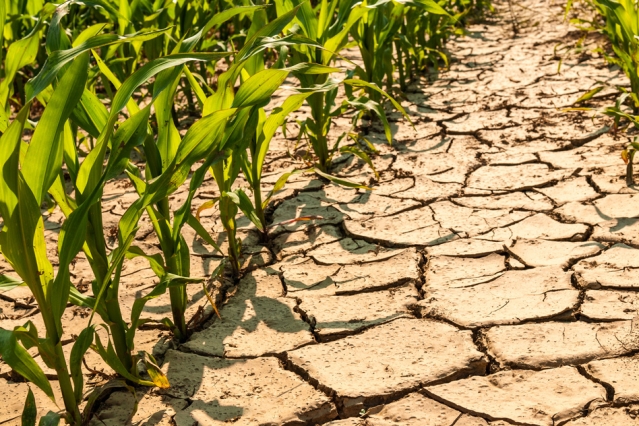
World Day to Combat Desertification and Drought: 40 per cent of Moldova's agricultural land affected by concerned phenomena
The World Day to Combat Desertification and Drought is marked this year under the slogan, Restore the Land. Unlock Opportunities. In Moldova, the effects of climate change are increasingly impacting soils: temperatures are rising, precipitation is unpredictable and the alternation between drought and floods leads to erosion, dryness and loss of soil fertility, Ministry of Environment has reported.
"Desertification is a slow process, by which the land loses its fertility and becomes increasingly difficult to cultivate. This phenomenon occurs due to climate change, prolonged droughts and unsustainable human activities. Agricultural lands in several regions of the country are already affected by drought, overuse and lack of sustainable agricultural practices. It is estimated that about 30–40 per cent of the agricultural land area of Moldova is hit by these phenomena," the cited source noted.
According to environmentalists, desertification and drought are not just environmental problems—they endanger agriculture, food security, and ultimately people's well-being.
"It's a challenge that concerns all of us, whether we live in urban or rural areas. Therefore, it's crucial to adopt sustainable agricultural practices, protect the soil, and conserve water resources," the ministry also said.
Recommended measures:
● Planting trees and reforesting affected areas;
● Restoring vegetation and degraded ecosystems;
● Rational use of water;
● Reducing and recycling waste.
Temperature variations, heavy rainfall followed by aridity periods, prolonged droughts and soil degradation are increasingly frequent phenomena in Moldova. It is estimated that, by 2030, climate change will reduce surface water flows by 16–20 per cent; the total annual amount of precipitation will decrease by 13 per cent, and the average annual temperature will rise by about 2°C between 2010 and 2040. These changes amplify land degradation processes, severely impact agricultural production with losses of over 30 per cent in 2022 for wheat and corn, and expose about 30% of agricultural lands to severe erosion.In this context, the World Day to Combat Desertification and Drought, marked annually on June 17, becomes increasingly relevant for countries like Moldova. Established by the United Nations General Assembly in 1994 (A/RES/49/115), this day is an opportunity to assess progress, promote practical solutions and strengthen cooperation in fighting desertification, land degradation and drought, aiming for a secure and resilient future.
The 2025 campaign is carried out under the slogan, Restore the Land. Harness the Opportunities, highlighting the multiple benefits of land restoration: job creation, strengthening food and water security, supporting climate actions and enhancing economic resilience. The global goal for this year is to restore 1.5 billion hectares of degraded land worldwide and to kickstart a trillion-dollar land restoration economy by 2030.
Moldova joined the UN Convention to Combat Desertification (UNCCD) in 1998, committing to implement policies and actions that address environmental challenges through an integrated approach aligned with UNCCD goals and optimal use of natural resources. Therefore, implementing the assumed commitments becomes essential, considering that the process of land degradation is accompanied by the expansion of areas meant for construction (the expansion of anthropogenic landscapes), to the detriment of forested or grassland areas (natural landscapes). Investments in degraded soil restoration projects can not only mitigate the effects of climate change, but also protect biodiversity and revitalize local economies. Only through strong international and national cooperation, as well as the active involvement of communities, the environmental challenges can be overcome and turned into opportunities.
Environmental policies for benefit of citizens discussed at Moldova's parliament
Moldova goes up in Global Gender Equality Ranking; Moldovan president describes this as result showing country's progress
Moldova Post Office temporarily suspends postal services to Israel
Moldovan Embassy in Israel suspends regular consular services, to provide only emergency services
First ever medical event in Moldova: child saved through liver transplant
Moldova, Romania create network of professionals in child protection
Prime Minister: Cahul is developing and modernizing rapidly thanks to government support and European funds #MoldovaCan
Over 295,000 children to receive 1,000 lei before new school year
Ecological festival Sun Dă-i Fest 2025 to be held in Chisinau on June 22
State distinctions' system of Moldova to be be revised; new orders, medals to be introduced into legislation
State advertising to be regulated by law in Moldova
PHOTO GALLERY // Olympiad Winners in Romanian Language and Literature, History of Romanians awarded in Moldova
Moldovan driving licenses to be recognized in Italy, Latvia
Voluntary amalgamation in Leova and Fălești districts: New opportunities for investments and better services for citizens
European Commission increases financial support for Moldova by 2 million euros
Moldovan lawyers to be able to practice in EU after accession
Spokesman's reaction to government protests
Marculesti Airport of Moldova to be transformed into passenger, cargo hub
Government approved budget amendment: 1,000 lei school aid for grades I-IX students
Diplomatic incident at World Congress of Vine and Wine
Moldovans to be able to receive money for returned packaging
Approved by Government: Voluntary amalgamation of localities in Leova and Fălești
12 Moldovan citizens evacuated from Israel
INTERVIEW MOLDPRES // Valentin Chirita, Vice Dean at the Stefan cel Mare Academy, says budget-enrolled students get guaranteed job
Croatia reaffirms support for Moldova's European integration


